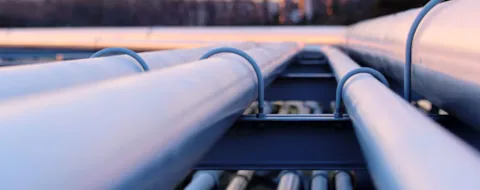Billion-dollar microbial corrosion issue tackled by a new Joint Industry Project
DNV has joined ExxonMobil Upstream Research Company and Microbial Insights to develop the next generation of microbiologically influenced corrosion detection, monitoring and mitigation technology.
HOUSTON, Texas, US, 4 August 2022 - DNV, the independent energy expert and assurance provider, has joined ExxonMobil Upstream Research Company and Microbial Insights, Inc in a Joint Industry Project (JIP) to develop the next generation of microbiologically influenced corrosion (MIC) detection, monitoring and mitigation technology.
With global costs of corrosion estimated at USD 2.5 trillion, the project aims to significantly enhance detection and monitoring methods of microbiologically influenced corrosion (MIC).
Difficult to detect and monitor, MIC poses a significant problem in numerous industries, and taking early action to mitigate its effects can protect the environment and safe operations by reducing the risk of costly pipeline failures.
Assembling MIC experts from across the industry, the project plans to create up to 1,200 datapoints of corrosion-to-biomarker correlations, generated on simulated pipelines with actual field waters and participant-selected service conditions. The team aims to develop methods, tools and workflows ("biomarker technology") to improve reliable detect of MIC in oil field operations, heavily leveraging advanced laboratory (bio)reactors and molecular analytical platforms that have been specifically developed for MIC biomarker discovery and KPI development.
Richard S. Barnes, Region President, Energy Systems North America at DNV, “Working with ExxonMobil Upstream Research and Microbial Insights we will unravel the most relevant MIC mechanisms prevalent in oil and gas operations to better understand their impact on corrosion. The focus of the JIP is to develop leading indicators which allows operators to develop and implement the right approach to address MIC in its earliest stages, protecting people and the environment while ensuring continuous, safe operations.”
“Corrosion is a global issue, and the work we have already undertaken at DNV to mitigate pipeline failure risk caused by MIC has given us a platform to further the advancement of early detection methods. The MIC biomarkers identified during this JIP could also be used to monitor and manage MIC for other applications including, underground gas storage, offshore wind turbines, cooling water plants, water storage tanks, drinking water pipelines, ship hulls, fuel tanks etc.” added Dr Susmitha Purnima Kotu, DNV JIP Lead.
Molecular methods for the detection and characterization of microorganisms in oil field waters have emerged, but data tends to poorly correlate to system integrity and cannot currently be used as a leading indicator for MIC. Instead, MIC is most often diagnosed through analysis of metal-associated biofilms after damage has already occurred and other (abiotic) mechanisms have been excluded as root causes.
Consequently, the management of MIC remains a significant and potentially damaging challenge, with industry continuing to suffer from instances of shortened service life infrastructure due to undetected, harmful microbial activity.
DNV intends to partner with 6-10 additional project participants with a history of MIC, or areas of particular interest for use in laboratory simulation to assist in generating samples which will aid biomarker discovery.
-ENDS-
For more information about the MIC JIP please contact:
- Dr Susmitha Purnima Kotu, Engineer, Energy Systems
- Jose Rafael Vera, Senior Principal Engineer, Energy Systems
For media enquiries, please contact:
- Neil Slater, Head of Media Relations, Energy Systems
- Penda Sall, Media Relations, Energy Systems
About DNV
DNV is the independent expert in risk management and quality assurance, operating in more than 100 countries. Through its broad experience and deep expertise DNV advances safety and sustainable performance, sets industry benchmarks, and inspires and invents solutions.
Whether assessing a new ship design, optimizing the performance of a wind farm, analysing sensor data from a gas pipeline or certifying a food company’s supply chain, DNV enables its customers and their stakeholders to manage technological and regulatory complexity with confidence.
Driven by its purpose, to safeguard life, property, and the environment, DNV helps tackle the challenges and global transformations facing its customers and the world today and is a trusted voice for many of the world’s most successful and forward-thinking companies.
In the energy industry
DNV provides assurance to the entire energy value chain through its advisory, monitoring, verification, and certification services. As the world's leading resource of independent energy experts and technical advisors, the assurance provider helps industries and governments to navigate the many complex, interrelated transitions taking place globally and regionally, in the energy industry. DNV is committed to realizing the goals of the Paris Agreement, and supports customers to transition faster to a deeply decarbonized energy system. Learn more at www.dnv.com
